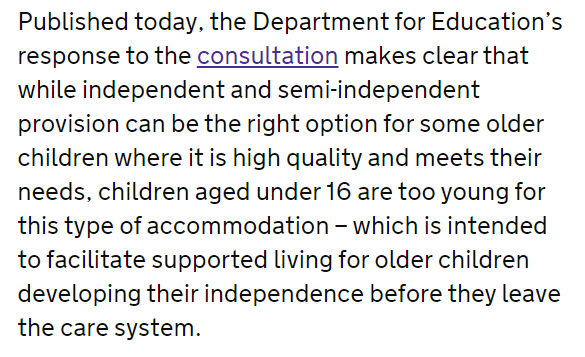
So disappointing to see the decision made by @educationgovuk today to move forward with its proposals to establish a set of national minimum standards for currently unregulated accommodation.
https://www.gov.uk/government/news/unregulated-accommodation-banned-for-vulnerable-children-under-16 https://twitter.com/Become1992/status/1362670011760971776
Action on this is good and urgently needed. But these proposals establish a dangerous precedent - an expectation that 16 and 17 year olds don't need care.
It goes completely against other recent policy developments - such as Staying Put - which seek to *extend* aspects of care.
It goes completely against other recent policy developments - such as Staying Put - which seek to *extend* aspects of care.
Unregulated settings were only intended to be used for a very small number of children. As a result of the growing number of older children in care and the lack of capacity in children's homes where it's needed most, the system is now over-reliant on unregulated to fill the gap.
It's a symptom of the problem and not a solution to be embraced as a norm in care. It's arisen by accident and not design.
Let's not run towards this with open arms! Let's consider *why* this has happened and what the root causes are, and figure out what's best, not just easy.
Let's not run towards this with open arms! Let's consider *why* this has happened and what the root causes are, and figure out what's best, not just easy.
Nobody sat down ten years ago to decide that semi-independent and independent settings for children aged 16 and 17 should be actively encouraged.
It's a consequence of deepening privatisation and not a deliberate choice on what's in the best interests of young people.
It's a consequence of deepening privatisation and not a deliberate choice on what's in the best interests of young people.
The government's plans are founded on the notion that these settings provide a helpful 'stepping stone' on the mythical 'transition to independence' expected of young people approaching leaving care age.
The evidence does not back this up.
The evidence does not back this up.
Remember: unregulated settings disproportionately support very recent entrants to care and unaccompanied asylum-seeking young people.
It's a fantasy to suggest that every child living in unregulated is there as part of a gradual and supported move with thorough care planning.
It's a fantasy to suggest that every child living in unregulated is there as part of a gradual and supported move with thorough care planning.
I've heard from young people (and their care providers) about the expectation now that they move to a semi-independent setting at age 16.
We've already got enough of a #CareCliff as it is. The system does not need another one.
Quote taken from https://www.becomecharity.org.uk/for-professionals/resources/response-to-consultation-on-unregulated-accommodation-2020/.
We've already got enough of a #CareCliff as it is. The system does not need another one.
Quote taken from https://www.becomecharity.org.uk/for-professionals/resources/response-to-consultation-on-unregulated-accommodation-2020/.
Young people's lives can change, often really quickly. Let's not welcome a system which doesn't offer the flexibility to adapt to changing circumstances.
We don't need an entirely separate set of (lower) standards which dictate the limits of what children in care can expect.
We don't need an entirely separate set of (lower) standards which dictate the limits of what children in care can expect.
We don't expect a lesser standard of care anywhere else when young people turn 16.
We can recognise and celebrate young people's growing autonomy as they get older in ways which aren't denying them care and the support they might need if things change for them.
We can recognise and celebrate young people's growing autonomy as they get older in ways which aren't denying them care and the support they might need if things change for them.
Can someone please explain to me what magical process they expect is happening on a child's 16th birthday which makes this okay?
Here's a care-experienced young person explaining this much better than I can in our @Become1992 consultation response from last year.
Here's a care-experienced young person explaining this much better than I can in our @Become1992 consultation response from last year.
To be really clear - this isn't an attack on all provision that's currently unregulated. I've heard from lots of young people who found the right place for them. There are some brilliant providers who should be celebrated.
It's the system underpinning this that needs reform.
It's the system underpinning this that needs reform.

 Read on Twitter
Read on Twitter






